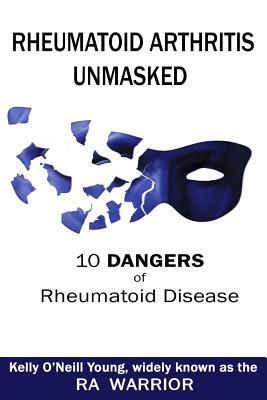- What if no one confused rheumatoid disease with just arthritis?
- What if the world understand that people with rheumatoid disease (RD) are not hypochondriacs because they have so many health problems?
- What if all of the effects of the disease were treated - not dismissed or ignored?
- Patients will be armed to fight against becoming a victim of the RD mortality gap
- Doctors will know how to better diagnose and treat RD
- Friends and family will understand that their loved one with RD has a serious disease
This book will arm you with facts that will save lives. "I admire deeply your ability to collect information, express feelings, write clearly and compelling, and point to why it matters. That's what the best change agents do, and you're tops." e-Patient Dave deBronkart EXCERPT FROM CHAPTER 1
One unfortunate effect of viewing the disease solely in terms of joint symptoms is the undocumented smoldering disease activity that takes place even in so-called "responders to treatment. Nearly every patient I've met who has been told she is "in remission" experiences joint symptoms either regularly or in the form of periodic flares. Furthermore, I have observed several people who experienced serious extra-articular illness after long periods of treatment-induced joint-symptom "remission."
Likewise, and editorial by Harvard rheumatology investigator Daniel Solomon points out that even when medical treatment successfully improves joint symptoms, "patients with RA continue to suffer from a variety of extra-articular manifestations, including cardiovascular disease (CVD).1> Health care professionals are mainly aware that the disease affects hands, but other disease symptoms are less readily acknowledged, examined, or measured. While the disease is referred to as "a type of arthritis,"2 it is difficult for people with rheumatoid disease to obtain appropriate medical attention for non-joint symptoms or for lesser-known "joints" such as vocal cords. Effective treatments do not yet exist to eliminate every disease effect n every patient. However, making health care workers, academics, and investigators aware of systemic disease effects is a necessary first step.
Note: This book discusses rheumatoid arthritis symptoms that are beyond joints, often mistakenly thought of as rheumatoid arthritis complications. It is a rheumatoid arthritis guide like no other, a medical reference book for patients, medical students, and health care professionals who care for rheumatoid arthritis patients. Most people understand rheumatoid arthritis / rheumatoid disease (RD) as an autoimmune disease that results in chronic pain in joints. However the notion of autoimmune arthritis is insufficient for RD since it usually limits perspective to the musculoskeletal disease only. This book uses medical research to show how this most common rheumatic disease affects organs and body systems as well as joints.
